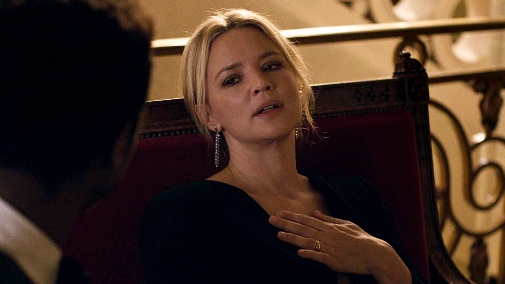
Belgian-born French actress Virginie Efira has been on an upward path since around 2016, when she supported Isabelle Huppert in the Oscar-nominated Elle and dazzled as the titular lawyer in Justine Triet's Victoria. The latter part earned the thespian her first César nomination, followed by citations for Sink or Swim, An Impossible Love, Bye Bye Morons, Benedetta, and, finally, a victory thanks to Revoir Paris. And yet, beyond the Francoshpere, Efira is probably best known for Verhoeven's mad nun and little else. That's going to change fast. After 2023, there's no stopping her rise to international stardom.
This week, American cinemas welcomed Madeleine Collins, Efira's third release of the year, following career-best work in Other People's Children and Revoir Paris. Just the Two of Us and All to Play For are still awaiting distribution making for a titanic body of recent work. In a just world, this next awards season would see Virginie Efira on critics' ballots everywhere.
For all that Madeleine Collins is the Virginie Efira show, the film begins without her...
In an opening salvo decontextualized for maximum intrigue, director Antoine Barraud leads us into a high-end dress shop, his serpentine camera slithering after an anonymous blonde. Cuts absent in the swirl of continuous motion, the scene starts calm in celebration of elegance, the mystery woman picking some frocks to try on. However, a storm is brewing in the form of a dizzy spell, a fall, an off-screen disaster, mayhap death. It's impossible to be sure, and Barraud isn't interested in answering our questions, preferring to impose a smokescreen of Hitchcockian pretensions for the time being.

And so, he moves onward, into an unspecified time later when another blonde goes about her day. She's Justine Fauvet, a busy translator played by Efira, and she leads a double life. In Switzerland, the woman enjoys her time with the handsome Abdel and their three-year-old daughter, Nina. Tensions abound about her need to often travel away from home, but the domestic realm feels two steps away from idyll. In France, Judith is married to Melvil, a successful orchestra conductor with whom she has two sons. Here, too, her absence from home poses a fractious bother, but the status quo prevails. Indeed, the couple is looking for a new house.
Faced with its protagonist's risky behavior, the film does little to highlight the first inklings of transgression, and Efira's performance handles the material with an even higher degree of nonchalance. Judith's deceptions are a matter of fact, so regular they've become nearly second nature. Because the performer doesn't emphasize the woman's social unorthodoxy, the breaking of taboo feels more shocking. There's also a level of seduction at play, beckoning the viewer into the mystery of Judith by refusing to have the leading lady explain herself to us, to the camera that's often dancing between domesticity and glamour.

Some of the greatest screen actors of all time achieve such lofty repute by promoting complicity between themselves and the audience through the lens' proxy. Efira chooses a thornier register for her introductory scenes. Sure, she's working for the camera, exercising the transparent emoting so prominent in scenes like a Birth-like bit of performed spectatorship. However, there's something held back, a secret that insists on remaining undisclosed. Even as the story progresses and the distance shortens between audience and star, Efira will keep some enigmatic qualities, as if savoring the taste of her character's full interiority, a selfishly enjoyed delicacy.
It's the solipsistic twin to her Revoir Paris performance, another turn dependent on evasion toward those who gaze upon her. Perchance that quality is further reflection of Judith's own selfishness within the tale. But do her lies trace back to egotism, or is she motivated by pure recklessness? Is she just mad? At one point, Judith declares herself crazy, claiming to be frightened of her own mind. In control she's out of control, like in a moment when Judith seems to be briefly pondering – flirting, really – with the turn of her double life into triple deceit. Between obstinate dualities and mastered subterfuge, Efira makes senselessness taste like reason, leaving enough space for everything to go wrong.
It takes little to make the house of cards come down, that ease of elision failing to smother the hurt of the betrayer betrayed. When Abdel brings home another woman, one suddenly gets to see Judith out of step, somehow unable to adapt her body to the situation or stop her visage from disclosing her heart's truth. It's a fleeting thing, a shock that will repeat as echo, clarity wavering in the tourbillion of other lies. Disaffected naturalism will give way, in slow and gradual fashion, to a kind of operatic expressivity rarely rising above sotto voce. Only when Judith is suffering a complete and total breakdown does it get properly loud.

Still, Efira's assurance over the compartmentalized characterization remains steady, nearly forceful in its dramatic genius. The script Barraud penned with Héléna Klotz would be nothing without the formidable interpreter, one capable of implying stakes over what, in retrospect, feels small on the verge of anodyne. That's not to say Efira is struggling against the film's edifice, for that is entirely built around her presence. So much so that one of the picture's climaxes rests altogether on the actress' face, a cascade of revelations taking a step back from the character's deconstruction. The causes of it all – grief, helplessness, folly – are nothing compared to the emotional consequences embodied by Efira. In her hands, Madeleine Collins reveals itself unashamed melodrama more than a mystery, its genre stylings mere framing for the portrait of a woman lying to herself, disintegrating along the way.
What's your favorite Virginie Efira performance? Is it part of her 2023 trifecta or something else?